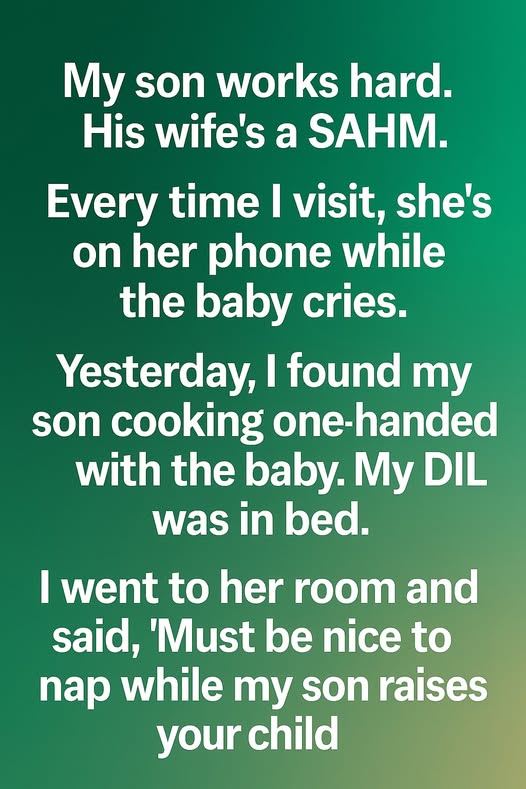My son has always been the type to carry responsibility quietly, never complaining. He works long hours, yet somehow comes home with enough patience and gentleness to tell bedtime stories and soothe a crying baby in the middle of the night. His wife stays home to care for their child, and I’ll admit—I’d been uneasy every time I visited. Something always seemed off: dishes piled high, laundry overflowing, my daughter-in-law curled on the couch or in bed, phone in hand, the baby fussing nearby. And then yesterday, when I arrived without warning, I saw my son cooking dinner with one arm while rocking the baby with the other. She was nowhere to be seen.
Months of simmering frustration finally boiled over. I marched into their bedroom and found her under the blanket, eyes half open, face pale and exhausted. Without thinking—without a pause to breathe—I snapped, “Must be nice to nap while my son raises your child.”
The words left my mouth and burned instantly. She didn’t defend herself or argue. She simply looked at me with eyes so red and defeated that it made my chest tighten. Then, barely above a whisper, she said, “I’m trying,” pulling the blanket tighter around herself as if it were her only shield.
I left the room unsettled, irritated on the surface but feeling something heavier underneath. Guilt? Doubt? I ignored it, convinced I had said what needed to be said.
Later that night, after the baby was asleep and the house finally quiet, my son walked me to my car. He stood silently at first, hands shoved into his pockets, shoulders slumped, before speaking in a low, heavy voice.
“Mom,” he said finally, “she’s not napping because she’s lazy.”
I frowned. “Then what is it?”
“The doctor thinks she might have postpartum depression,” he said.
The words hit me like a cold wave. He continued quietly, as if speaking too loudly might shatter something fragile.
“She barely sleeps. She barely eats. Sometimes she’s scared to hold the baby because she thinks she’ll drop him. She stays in bed because she feels like everything she does is wrong. She isn’t ignoring our son—she’s drowning.”
Every judgment I had passed on her flashed through my mind: the blank stare, the trembling hands, the endless scrolling of her phone, the flinch when the baby cried. None of it was laziness—it was the struggle of a woman at war with her own mind.
My son wasn’t angry. He was hurt, disappointed. “She already feels like she’s failing,” he said softly. “Comments like what you said today… they don’t help. They push her further down.”
Shame wrapped around me like a vise. I had walked in thinking I understood the whole story and opened my mouth without pause. I had prided myself on being a good mother, yet here I was, adding weight to a situation I barely understood.
That night, I barely slept.
The next morning, I returned to their house before my son left for work. I knocked gently on her bedroom door, and when she looked up—surprised and wary—I asked if I could come in. She nodded.
I sat on the edge of the bed and took a deep breath. “I owe you an apology,” I said. Not a polished one, not full of excuses, but a real one. “I judged you without knowing what you were going through. I’m sorry.”
Her face crumpled, tears streaming down her cheeks as she whispered, “I feel like I’m failing everyone.”
I reached for her hand. “You’re not failing. You’re struggling. And that’s not the same thing.”
Slowly, she opened up, telling me about the fear that never let her rest, the exhaustion that never eased, the intrusive thoughts that scared her. She admitted she had hidden it from everyone out of shame—shame that she wasn’t the picture-perfect mother she thought she had to be.
I listened. Truly listened. And with every word, the weight of my earlier judgment grew heavier.
When she finished, I squeezed her hand. “You’re not alone. You don’t have to be alone in this.”
A small release of tension passed over her face. Not forgiveness yet—but a sign that she could finally breathe.
Over the following weeks, I stepped in, not as a critic but as support. I cooked meals, held the baby, folded laundry while she talked about what her therapist had said. I reminded her to eat, to breathe, to trust herself.
Gradually, she began emerging from bed more often. She smiled at the baby again. She laughed—quietly at first, then with more warmth. My son looked lighter too. One evening he said, “She’s starting to feel like herself again.”
I nodded, grateful that I hadn’t let pride prevent me from apologizing when it mattered most.
The truth is, it’s easy to misjudge what we only see on the surface. Exhaustion can look like apathy; fear can look like irresponsibility. Families don’t grow stronger by assuming the worst. They grow when someone takes a moment to see what’s happening beneath the surface.
Sometimes, the greatest act of love is simply listening.
I learned that the hard way—but I learned it.
